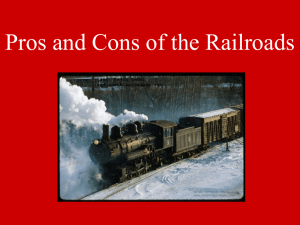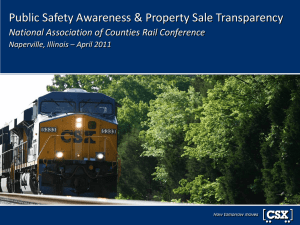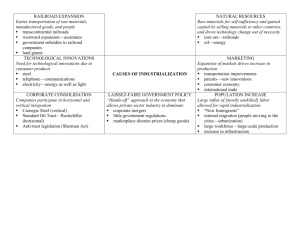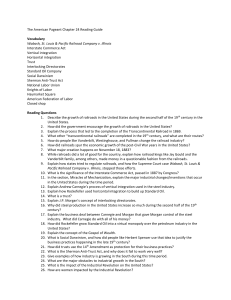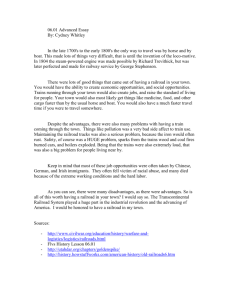Industrialization: Railroads Lead the Way
advertisement
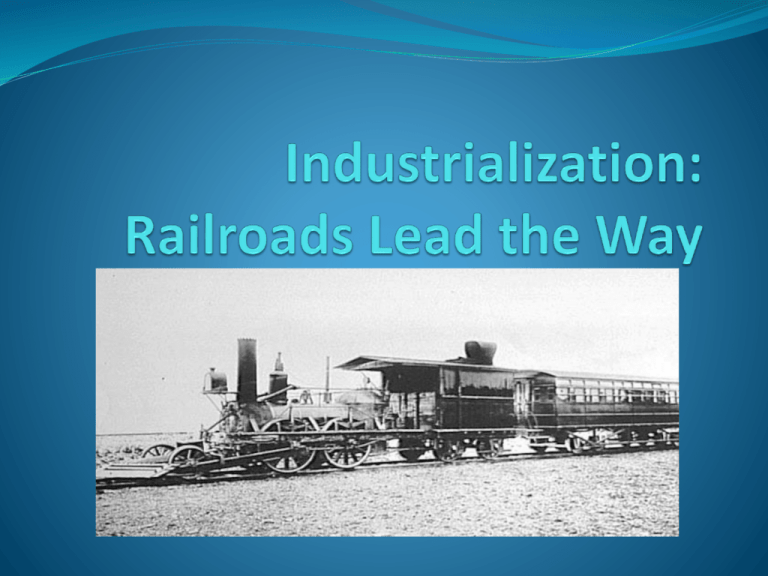
What influenced the growth of the railroad? There’s gold in them there hills!! California Gold Rush 1849 The discovery of silver and gold in Montana Idaho Colorado Alaska Merchants followed miners West Homesteaders Cattle Ranchers Development of the railroads 1850 Railroads in the United States By the1860’s the railroads had expanded 1863 Two companies competed to build the first transcontinental railroad The Union Pacific Railroad started building westward from Omaha, Nebraska The Central Pacific Railroad started building eastward from Sacramento, California Inventors and New Railroad Technology George Westinghouse- air brakes that improved the system for putting the trains to a halt, which made the trains themselves much safer. Eli H. Janney- Janney car couplers made it easier for railroad workers to link train cars. Gustavus Swift- refrigerated cars helped railroads to ship meat, and other perishable goods over long distances. George M. Pullman- the Pullman sleeping car- a luxury railway car with seats that converted into beds for overnight journeys. Pullman also made improved dining cars, raising train travel to a new level of comfort. Railroads Move the Nation West! •The growth of railroads pave the way for American Industry to move west. •In the 1800’s the flour industry moved west from east coast to Kansas City! •Agriculture development moved west as well from New York to Wisconsin •Trains distributed people out west- easier for people to move from rural areas to urban areas known as urbanization! Railroad Transform the Nation’s Economy Railroads transported raw materials- iron, coal, timber steel… these industries BOOMED! The mining industry increased and farmers were able to ship products across the country all year long machines sent to farmers for faster jobs (tractors) Growth of Industries Lumber industryThe industry boomed as lumber was needed for RR ties as well as for buildings in the new towns across the country. Growth of Industries Coal industryProvided fuel for locomotives and heat for homes. This industry had incredible growth. Consolidation of railroads Smaller lines were often costly to run Railroad Barons emerge as larger companies buy up the smaller ones An 1870 cartoon shows Cornelius Vanderbilt straddling two railroads he consolidated and racing Jim Fisk of the Erie Railroad. Competition Destroyed by Rebates and Pools •Railroad companies often fought each other for old customers, and for new customers. •To their biggest companies, railroad companies offered rebates- these were secret discounts. •Smaller companies could not compete with rebates that bigger companies offered, and were forced out of business. •Giving these discounts forced companies to put freight rates for farmers and other customers who shipped a small amount of goods. •Railroad Barons also made secret agreements among themselves, known as pools. They divided the railroad business, and set rates on the region. •And with no other competition in the region, the company could charge higher rates and earn larger profits than ever! •Congress tried to control this situation by passing laws, but it did not stop the railroad barons! What does the development of railroads have to do with time? Why are there time zones? Our system of time zones is a result of the railroad boom Towns kept their own time 1883 all railway clocks were set to new standard Congress enacted Standard Time Act -1918- based on railroad time zones Time Zones •Railroads affected the way Americans thought about time as well! •People began measuring distances by how many hours the trip would take rather than the number miles! •This led to a national system of time with four time zones! Advantages/Disadvantages Write 3 advantages and 3 disadvantages of the expansion of the railroad Make sure to include who these advantages and disadvantages affected

